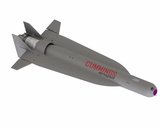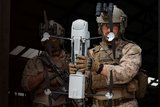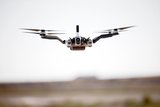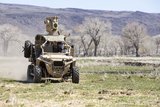AUVSI: Army keynotes outline thoughts on unmanned future
Keynoting at the opening of Unmanned Systems North America two US Army generals outlined their views on the importance of current and future unmanned systems.
Lt Gen Rick Lynch, Commanding General US Army Installation Management Command and Assistant Chief of Staff for Installation Management, pointed to three basic categories that he viewed as being important for unmanned systems development in the military arena.
Lynch believes the three most important ways that unmanned systems can assist the warfighter are: improved surveillance, reduced workload; and increased survivability for the warfighter.
'What’s lacking still today is the ability for a persistent stare.' Lynch stated. Pointing to his own experience in Iraq he added: 'What I did not have was the ability to watch an area with a persistent stare. What I had was unmanned aerial systems...but the problem was I didn't have sufficient loiter time.'
He added that the expected decrease in defence budgets would also improve an opportunity for unmanned systems. With the expectation that the US armed forces will have to find a trillion dollars in efficiencies, Lynch said that unmanned systems could provide a way to reduce the workload both in front line operations and at home bases.
Finally, Lynch concluded that unmanned systems can make the battlefield more survivable for warfighters in a number of ways. However, he was concerned that the roll out of systems was not necessarily at the speed he would like. 'If we're not fielding, we're failing,' Lynch stated. 'I see progress but not progress at the pace that we would like.'
Following on from Lynch, Maj Gen Walter Davis Deputy Director, US Army Capabilities Integration Center, US Army Training and Doctrine Command (TRADOC), outlined his organisation's thoughts on the future of unmanned systems.
Davis said that the ability to weaponise and humanise robots is no longer science fiction and that the military and society in general need to prepare for that future. 'We need to really consider the moral and ethical implications,' he stated.
'What are the considerations for when we have truly autonomous systems,' Davis stated. In order to ensure that fully autonomous systems can be integrated within the military, it would need to have trust and confidence in the systems.
Turning to the potential capabilities that unmanned systems can provide to the warfighter, Davis stated that robotics should enable and replace the human, but that the user should not have accommodate the systems that they utilise.
The tasks that TRADOC believes can provide the greatest potential gains for the warfighter include logistics, medical, security, maintenance and engineering. 'The key point to be made is that we have to do a good assessment of robotics in relation to the tasks,' Davis concluded.
More from Uncrewed Vehicles
-
![Cummings Aerospace showcases Hellhound loitering munition designed for US Army’s LASSO programme (video)]()
Cummings Aerospace showcases Hellhound loitering munition designed for US Army’s LASSO programme (video)
Cummings Aerospace presented its turbojet-powered Hellhound loitering munition at SOF Week 2025, offering a man-portable solution aligned with the US Army’s LASSO requirements.
-
![SOF Week 2025: PDW unveils attritable FPV drone for SOF operations at scale]()
SOF Week 2025: PDW unveils attritable FPV drone for SOF operations at scale
PDW has revealed its Attritable Multirotor First Person View drone at SOF Week 2025, offering special operations forces a low-cost, rapidly deployable platform for strike and ISR missions, inspired by battlefield lessons from Ukraine.
-
![SOF Week 2025: Teledyne FLIR white paper provides guidance on reusable loitering munitions]()
SOF Week 2025: Teledyne FLIR white paper provides guidance on reusable loitering munitions
Teledyne FLIR is highlighting the emerging requirements for 'recoverable and re-usable' loitering munitions across the contemporary operating environment during this week’s SOF Week conference in Tampa, Florida.
-
![SOF Week 2025: Kraken Technology group debuts K3 Scout USV in North America]()
SOF Week 2025: Kraken Technology group debuts K3 Scout USV in North America
High-performance maritime industry player Kraken Technology Group, based in the UK, has used the SOF Week conference in Tampa, Florida this week to debut its K3 Scout uncrewed surface vessel (USV) to the North American market.
-
![Palladyne AI and Red Cat to demonstrate capabilities for autonomous drone swarms to the US military]()
Palladyne AI and Red Cat to demonstrate capabilities for autonomous drone swarms to the US military
Red Cat and Palladyne AI recently conducted a cross-platform collaborative flight involving three diverse heterogeneous drones.
-
Jammer resistant drone designs spark search for countermeasures
The Russia-Ukraine conflict has driven another stage of evolution for drones and the counter measures to defend against them.

























